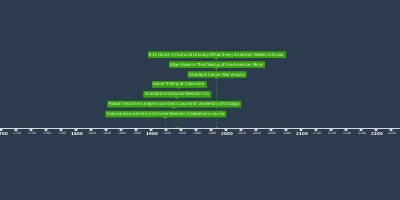Stanford "Western Culture" Course (4 fev 1980 ano – 23 abr 1988 ano)
Descrição:
"By the mid-1970s many Stanford faculty members recognized that the courses students chose outside their major disciplines all too often failed to achieve any coherence as a group, and, as a result, the Academic Senate gradually instituted a new set of liberal-arts requirements. One of these new requirements was Western Culture, with the second word intended to distinguish it from the old course, though the repetition of "Western" signaled a continuing commitment to the European intellectual tradition.In one respect, however, Western Culture differed strikingly from Western Civilization. Instead of being a single course administered by one department, it was designed as a group of related courses with significantly different emphases. Moreover, departments and programs were invited to submit course proposals stressing the concerns of their particular disciplines. Soon after the requirement was instituted in 1980, it boasted some half dozen "tracks" from which incoming Stanford undergraduates selected a single one according to their interests at that point in their development...
The required list of fifteen texts with which this essay began was created on pragmatic grounds to respond to the diversity of tracks that marked the new course. Since each track came from an area with its own intellectual agenda, a list of texts to be read in all tracks was necessary, it was agreed, to assure what was at the time termed a "common experience" for all Stanford students. Doubtless the distant memory of the once-successful single- track Western Civilization helped motivate this desire for some commonality of reading. Moreover, it was hoped (in vain, some later admitted), that stuents from diverse tracks would discuss and argue about the Republic, the Inferno, and other works from the core list at breakfast or late at night in their dormitory rooms. Those who selected the list claim that it was never intended to serve as a canon and that it certainly did not have for them the sacred aura that its later opponents accused them of attaching to it. Indeed, they readily admit that any number of other texts (including those from the "strongly recommended" list) might just as easily have made it to the core list. Above all, this list was kept deliberately short in order to leave ample room for each track to add texts suitable to the orientation of its own discipline.
Soon after it was instituted, Western Culture looked in every way like an extraordinarily successful course. Student evaluations, though varying somewhat from track to track, remained exceptionally high for a required course. " (Lindenberger)
Adicionado na linha do tempo:
Data:
4 fev 1980 ano
23 abr 1988 ano
~ 8 years and 2 months
